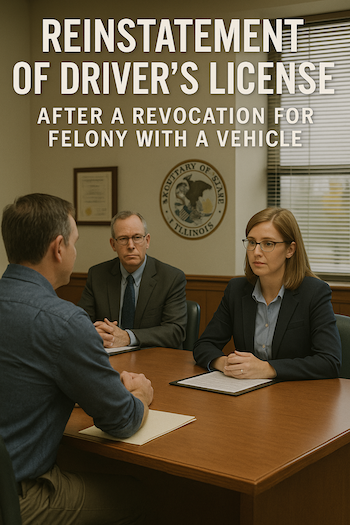 A driver's license revocation for committing a felony involving a vehicle in Illinois can have profound and long-lasting effects, restricting your mobility and complicating employment or daily responsibilities. As an experienced Illinois reinstatement lawyer and former Will County prosecutor with over 20 years in the field, I've assisted numerous clients in Joliet with reinstating licenses after felony convictions where a motor vehicle was used in the crime. At the Law Office of Jack L. Zaremba, we specialize in navigating these administrative revocations, which often stem from offenses like theft, assault, or drug crimes involving vehicles in Will County. In this blog post, we'll outline the legal basis for these revocations, reinstatement requirements, the process, common challenges, and tips for success in 2025. For related topics, review our guides on reinstatement after DUI and statutory summary suspensions .
A driver's license revocation for committing a felony involving a vehicle in Illinois can have profound and long-lasting effects, restricting your mobility and complicating employment or daily responsibilities. As an experienced Illinois reinstatement lawyer and former Will County prosecutor with over 20 years in the field, I've assisted numerous clients in Joliet with reinstating licenses after felony convictions where a motor vehicle was used in the crime. At the Law Office of Jack L. Zaremba, we specialize in navigating these administrative revocations, which often stem from offenses like theft, assault, or drug crimes involving vehicles in Will County. In this blog post, we'll outline the legal basis for these revocations, reinstatement requirements, the process, common challenges, and tips for success in 2025. For related topics, review our guides on reinstatement after DUI and statutory summary suspensions .
Understanding Revocation for Felony Committed with a Vehicle in Illinois
Under 625 ILCS 5/6-205(a)(3), the Illinois Secretary of State must immediately revoke your driver's license upon receiving a report of conviction for any felony (under state or federal law) in which a motor vehicle was used in the commission of the crime. This includes offenses like vehicular hijacking, aggravated fleeing, or using a vehicle in drug trafficking or assault. Unlike suspensions, revocations are indefinite until you successfully petition for reinstatement, with no fixed duration specified in the statute. In Will County, these often arise from traffic stops escalating to felony discoveries on roads like I-80. For the full statute, refer to the Illinois Vehicle Code on Mandatory Revocations .
In 2025, the Secretary of State emphasizes public safety in hearings, requiring proof you're no longer a risk, especially if the felony involved violence or recklessness.
Requirements for Reinstatement After Felony Vehicle Revocation
Reinstatement isn't automatic and demands demonstrating rehabilitation and compliance:
- Serve any court-imposed sentences, probation, or parole related to the felony.
- Resolve all underlying issues, such as paying fines, restitution, or completing mandated programs (e.g., anger management if violence-related).
- Obtain a favorable evaluation if substance abuse was involved, though not always required for non-DUI felonies.
- Provide SR-22 insurance to prove financial responsibility.
- For restricted driving permits (RDP), show undue hardship (e.g., no alternative transport for work) under 625 ILCS 5/6-205(c), with the Secretary's discretion.
No mandatory minimum revocation period is specified for this offense, but practical waits often exceed 1 year due to legal proceedings.
Steps for the Reinstatement Process
Follow these steps for reinstatement:
- Check Eligibility: Obtain your driving abstract from the Secretary of State to confirm the revocation and clear other holds.
- Gather Documentation: Compile felony conviction records, compliance proofs, character references (3-5 letters), employment verification, and hardship evidence.
- Apply for a Hearing: Submit an application for an informal (simpler cases) or formal hearing (complex felonies) with fees ($50-$250); formal hearings involve an administrative law judge.
- Attend the Hearing: Present your case, emphasizing rehabilitation, low reoffense risk, and public safety; be prepared for questions on the felony.
- Meet Post-Hearing Conditions: If approved, pay reinstatement fees ($500), pass tests if required, and install BAIID if mandated (rare for non-DUI but possible).
In 2025, virtual hearings remain available, but thorough preparation is key to avoid denials.
Common Challenges and Tips for Success
Challenges include proving no ongoing threat, especially for violent felonies, or addressing victim impact statements. In Joliet, intertwined criminal records can delay, and discretionary denials are common without strong evidence.
Tips:
- Start early, ideally after serving any sentence, to build a rehabilitation record.
- Challenge the original conviction if grounds exist, potentially vacating the revocation.
- Consider an RDP for limited driving to demonstrate responsibility.
- Appeal denials within 35 days with additional proofs or legal arguments.
We've helped Will County clients reinstate after vehicle-related felonies by focusing on positive changes, securing RDPs en route to full privileges.
Why Hire an Illinois Reinstatement Lawyer?
These revocations involve discretionary decisions; my prosecutorial background provides insight to craft compelling hearings and resolve complications.
If you're seeking reinstatement after a felony vehicle revocation in Will County, contact the Law Office of Jack L. Zaremba for a free consultation. Visit our contact page or call our Joliet office to get started in 2025. Regain your license and move forward.

